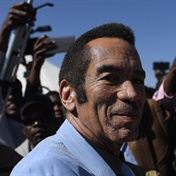
- The deportation of asylum seekers to Rwanda could remain as part of outgoing Prime Minister Boris Johnson's legacy.
- British Home Secretary Priti Patel is pushing for a second flight to Rwanda as Johnson's policy faces a court challenge.
- In an interview with News24, lawyer Qays Sediqi said the policy is egregious and xenophobic, and that it aims to prevent people from entering the UK to claim asylum.
Boris Johnson may have resigned as Britain's prime minister but one of his most divisive and controversial policies - the deportation of asylum seekers to Rwanda - could remain as part of his legacy, if British Home Secretary, Priti Patel gets her way.
But not if it's challenged in court.
After the first flight, which cost taxpayers about R20.43 million, was stopped at the eleventh hour from leaving Heathrow Airport for Kigali in June, Patel said: "We will not be deterred from doing the right thing and delivering our plans to control our nation's borders".
As people across the UK took to the streets on Saturday to protest against the "heinous" Rwanda deportation plan, News24 tracked down Qays Sediqi - a trailblazing advocate at Barnes Harrild and Dyer Solicitors in London.
READ | UK police open investigation into Farah trafficking revelations
Sediqi's name will be remembered for years to come for his role in stopping the first flight to Rwanda through a European Court of Human Rights (ECtHR) challenge.
Lenin Ndebele: With Boris Johnson gone, what does that mean for the Rwanda deportation deal?
Qays Sediqi: Due to the current political turmoil in the UK, there have been reports that nobody is going to be removed to Rwanda until a new prime minister is elected.
However, the Home Secretary, Priti Patel, is fighting tooth and nail to arrange yet another charter flight to Rwanda before the substantive judicial review hearing at the High Court, which has now been adjourned till September.
Ndebele: The Rwanda hearing which was listed for 19 July has been adjourned until September. What advantages does that have for the flight?
Sediqi: The challenge is a very large one with over 15 claimants represented by six law firms, over 25 counsel (from both sides) involved, and the UNHCR acting as an intervener.
Each [of the] parties make submissions and present their evidence which, as you can appreciate, is very large.
The adjournment allows each party to consider all the documents circulated between them which are over thousands of pages long. This, in turn, allows for a fair hearing to take place.
Ndebele: Why is the deportation deal an awful policy?
Sediqi: The policy is awful because, while the Home Office claims it will prevent and deter traffickers from illegally crossing the English Channel, that is not what it ultimately aims to do.
The policy is egregious and xenophobic in that it aims to prevent people from entering the UK to claim asylum.
The Home Secretary claims that it will promote legal entry into the UK. However, the thousands of asylum seekers who enter the UK will not be able to do so in the future.
It has to be borne in mind that the only way someone can claim asylum in the UK is when they are in the UK because paragraph 334(i) of the Immigration Rules provides that an asylum applicant will be granted refugee status in the United Kingdom, following a claim if the Secretary of State is satisfied that:
(i) they are in the United Kingdom or have arrived at a port of entry in the United Kingdom.
Therefore, nobody will be able to claim asylum if they are being prevented from entering the UK. The majority of asylum seekers enter the UK illegally because of the harsh immigration rules enforced, which they have to fulfil but which they cannot.
Therefore, it is clear that the Home Office introduced this outrageous policy to drastically reduce the number of asylum seekers.
Furthermore, as explained above, the Home Office claims that this policy will deter traffickers from illegally bringing individuals into the UK.
However, the majority of the time, traffickers do not get on the boat with the immigrants when they attempt to cross the channel. Additionally, most of the time, the traffickers force individuals to get on the boat and sometimes they are threatened with knives/weapons.
As such, the people who will face the consequences of this Rwanda policy are genuine asylum seekers who flee their country due to persecution.
Ndebele: If the UK leaves the ECHR, how will that impact human rights in the UK?
Sediqi: On 14 June 2022, the European Convention on Human Rights (ECHR) in Strasbourg granted our clients an interim order which prevented their removal to Rwanda.
This resulted in Dominic Raab, who is the deputy prime minister and Secretary of State for Justice introducing the Bill of Rights Bill on 22 June to abolish and replace the Human Rights Act 1998 which has been in operation since 2000.
The end of the Human Rights Act 1998 will mean a breach of the Good Friday Agreement, which expressly requires the UK to have the ECHR directly enforceable in Northern Ireland. This will also mean that Parliament will decide the UK's human rights.
Ndebele: The Sir Mo Farah story. What lessons are there to be learnt by migrants and also, the government?
Sediqi: The main message that Sir Mo Farah portrayed is that trafficking is real and it can affect anybody.
Nobody should have to suffer in silence and bottle up such a traumatic experience. I deal with many asylum seekers who are potential victims of trafficking who do not disclose trafficking until much later in their claims.
They don't disclose it because they are more afraid of their traffickers who threaten them if they disclose it, than they are of the government.
Many of my clients also tell me that they don't feel comfortable disclosing their trafficking experiences because they don't feel comfortable disclosing anything to the Home Office.
The Home Office makes them feel like they are their enemies. However, the Home Office is the first responder which means that they can refer someone into the National Referral Mechanism if they believe that they are potential victims of trafficking.
Ndebele: Your profile says you are a former refugee. From which county are you and what was your journey into the UK like… Did the UK help you achieve your hopes and dreams?
Sediqi: My parents are from Afghanistan but they moved to Pakistan in the mid-eighties due to the war in Afghanistan.
My father fled to the Netherlands and claimed asylum for political reasons. In 1997, my mother, siblings and I also moved to the Netherlands where we claimed asylum.
Luckily, back then, it was easier to enter countries. We flew to the Netherlands from Pakistan.
My mother divorced my father shortly after arriving. We moved to a refugee camp in south Holland where we remained for a long time before being offered permanent accommodation.
We obtained refugee status a year or two after entering the Netherlands. These were horrible times. We experienced abuse and racism – the world back then was less tolerant than it is now.
Therefore, I have first-hand experience of what it's like to be a refugee and go through the asylum process.
Q&A | The politics behind Peter Mutharika's intention to run for Malawi presidency in 2025
We moved to the UK in 2007 for better opportunities and because we had family here. I am grateful to the UK for having offered me opportunities, a career and acceptance.
The UK, at its core, is an accepting country that welcomes diversity and inclusivity, however, the people at the helm are the complete opposite and are morally corrupt.
The people in power attempt to paint refugees in a bad light; they contribute to high crime rates, they are economic migrants and are dangerous.
I am a prime example of a former refugee who is an asset to this country. Numerous other individuals are being deprived of reaching their full potential.




 Publications
Publications
 Partners
Partners























